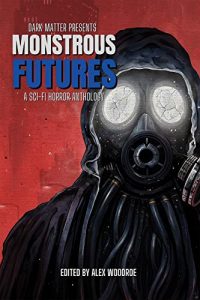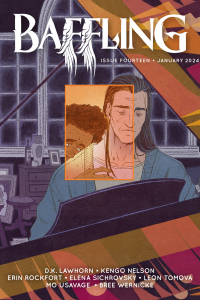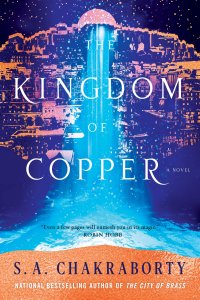Gabino Iglesias Reviews Dark Matter Presents Monstrous Futures: A Sci-Fi Horror Anthology by Alex Woodroe, ed.
 Dark Matter Presents Monstrous Futures: A Sci-Fi Horror Anthology, Alex Woodroe, ed., (Dark Matter Ink 978-1-95859-807-8, $19.99, 356pp, tp) April 2023. Cover by Olly Jeavons.
Dark Matter Presents Monstrous Futures: A Sci-Fi Horror Anthology, Alex Woodroe, ed., (Dark Matter Ink 978-1-95859-807-8, $19.99, 356pp, tp) April 2023. Cover by Olly Jeavons.
Monstrous Futures, edited by Alex Woodroe, is one of those rare anthologies that deliver great story after great story. While the 29 stories here are different in terms of format and voice, they share one important element: they see the future as a dystopia. In that sense, the entire anthology stands against some of the science fiction of the past in which technology was always a good thing was presented.
‘‘The dystopia is here, to invoke that old saw in a more haggard form, just unequally distributed, the ghost of a still-living Gibson looming over our existence with a bitter laugh. It’s always been here. It never went away, only changed its face.’’ These words from novelist Andrew F. Sullivan’s introduction perfectly encapsulate the atmosphere of this anthology; the future is here, and it’s not the healthy, happy, safe utopia we wanted. In fact, it’s the opposite; a dark world of excessive surveillance and unethical megacorporations in which the human body and mind still serve the system.
Reviewing every story in an anthology is always cumbersome, so instead, here are some I thought were standouts in an anthology that doesn’t contain any bad stories.
Koji A. Dae’s ‘‘The Least I Can Do’’, which chronicles a woman’s growing obsession with wearing a suit that makes you thinner, sexier, and look a decade younger, explores the ways in which our physical appearance is still important in the future, and how our human tendency to ignore warnings when we really like something can be even deadlier as technology advances and we come up with new ways of changing how we look.
Kevin M. Folliard’s ‘‘Normalcy Protocol’’ tells the story of a little vacuuming machine, the VaccuBot500, which is given a set of instructions that it will try to follow regardless of the cost. The narrative is about making someone’s life better, but the technology of 2031 defines what ‘‘good’’ is and then takes measures to make it happen. The ending is one of the best in the book, and it made me wish this was the start of a collection of intertwined stories. Also, bonus points to the author for keeping it dark while also delivering a healthy dose of humor.
Catherine Kuo’s ‘‘About a Broken Machine’’ takes a lot of dark human feelings and put them inside a robot, forcing readers to ponder just how sentient technology can become before it starts to feel and act like us, with all the possibilities that implies.
J.A.W. McCarthy’s ‘‘Consider This An Opportunity’’ follows a woman who’s spending time with a ‘‘temporary loved one’’ because her parents want to teach her yet another lesson. She eventually realizes that her brother, who is something akin to a very complex toy that will last only 30 days, can serve as a tool to make things right in the most awful way possible. The best thing about this one, which deals with family trauma, is that it builds to a conclusion that is simultaneously surprising and the only one that would make sense.
Avra Margariti’s ‘‘Who Sees All’’ is about a young woman whose parents install a microchip that’s supposed to keep her safe but that ultimately turns into a violation of her privacy because they see everything. It becomes something used to ‘‘spy on me, sever my queerness from the root.’’ There is no severance, but battling the constant supervision is a struggle that comes with a price.
Aigner Loren Wilson’s ‘‘How I Creak for You’’ is probably one of the strangest, creepiest stories in the anthology, and one of the most violent. It tells the story of a smart house in the process of becoming a real, organic, living thing and the evil man who’s building it…and using it to keep people he kills.
Simo Srivinas’s ‘‘Kavo, Beta (Eat, Child)’’, one of many richly diverse stories in this anthology, follows a trans man who’s using a new food service to connect with his Indian heritage. Unfortunately, some things come with a high cost, especially when they’re new technology, and everyone using the service soon learns just how high that cost can be.
Monstrous Futures pulls readers into a future – sometimes it a future as close as tomorrow – in which we have different versions of the same problems we have now. For example, M.H. Ayinde tackles racism and misogyny in ‘‘Fully Comprehensive Code Switch’’: ‘‘Your aggression levels have been adjusted downwards to compensate for your ethnic origin.’’ And that’s just the tip of the iceberg. From getting an abortion to dealing with parents who are angry at their LGBTQ+ kid and from struggling to find jobs to finding jobs that are less than perfect, the future we see in this anthology is one in which we are sometimes happy when machines get the upper hand.
Packed with great stories, and wonderfully diverse, Monstrous Futures walks a fine line between science fiction and horror, and every writer who interpreted the theme brought something different to the table. While the future is a constant, the anthology also has a great sense of cohesion in terms of some of its recurring themes: surveillance, the evils of rampant capitalism, identity, sexuality, and queerness. Also, anthologies are a perfect way to discover new writers, and this one delivered some favorites as well as some writers who were new to me, which is always a great thing. If you’re not afraid to look at future and see the bad things it can bring, don’t skip this one.
Gabino Iglesias is a writer, journalist, professor, and book reviewer living in Austin TX. He is the author of Zero Saints and Coyote Songs and the editor of Both Sides. His work has been nominated to the Bram Stoker and Locus Awards and won the Wonderland Book Award for Best Novel in 2019. His short stories have appeared in a plethora of anthologies and his non-fiction has appeared in the New York Times, the Los Angeles Times, and CrimeReads. His work has been published in five languages, optioned for film, and praised by authors as diverse as Roxane Gay, David Joy, Jerry Stahl, and Meg Gardiner. His reviews appear regularly in places like NPR, Publishers Weekly, the San Francisco Chronicle, Criminal Element, Mystery Tribune, Vol. 1 Brooklyn, the Los Angeles Review of Books, and other print and online venues. He’s been a juror for the Shirley Jackson Awards twice and has judged the PANK Big Book Contest, the Splatterpunk Awards, and the Newfound Prose Prize. He teaches creative writing at Southern New Hampshire University’s online MFA program. You can find him on Twitter at @Gabino_Iglesias.
This review and more like it in the August 2023 issue of Locus.
 While you are here, please take a moment to support Locus with a one-time or recurring donation. We rely on reader donations to keep the magazine and site going, and would like to keep the site paywall free, but WE NEED YOUR FINANCIAL SUPPORT to continue quality coverage of the science fiction and fantasy field.
While you are here, please take a moment to support Locus with a one-time or recurring donation. We rely on reader donations to keep the magazine and site going, and would like to keep the site paywall free, but WE NEED YOUR FINANCIAL SUPPORT to continue quality coverage of the science fiction and fantasy field.
©Locus Magazine. Copyrighted material may not be republished without permission of LSFF.






